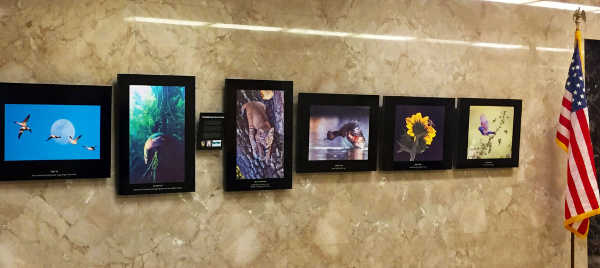KELSEYVILLE, Calif. – The Lake County Amateur Radio Society will meet on Thursday, Jan. 25, at Kelseyville Pizza.
Community
KELSEYVILLE, Calif. – The Lake County Democratic Central Committee will hold its regular monthly business meeting on Thursday, Feb. 1.

Santa Clara resident Shravan Sundaram's photograph of a young bobcat descending a tree in Livermore's Sycamore Grove Park earned the 2017 grand prize in the California Wildlife Photo of the Year contest.
SACRAMENTO – California Attorney General Xavier Becerra on Wednesday filed a lawsuit against the Trump Administration over its decision to repeal regulations governing hydraulic fracturing (fracking) of oil and gas wells drilled on federal and Native American tribal lands.
KELSEYVILLE, Calif. – The Taylor Observatory invites the community to the first 2018 Window to the Universe presentation on Saturday, Jan. 27.
The presentation will begin at 7:20 p.m. at the observatory, 5725 Oak Hills Lane, Kelseyville.
The evening will include a full dome planetarium show and a presentation on the January night sky at 7:20 p.m., followed by a presentation at 8 p.m. by Friends of the Taylor Observatory President Bill Haddon on ““What’s up at Taylor Observatory?”
At 8:10 a.m., Tim Gill will give a lecture on infinity and the universe. This talk will describe the mathematics of infinity and how this applies to an infinite universe.
At 9 p.m. there will be another planetarium show and, should clear skies prevail, there will be a telescope viewing from 9 to 10:30 p.m. with Taylor staff.
Winter astronomic delights such as the Orion Nebula will be observed from the newly constructed Taylor Observatory Star Deck. They may catch a view of Comet C2017/T2 Heinze in the big scope.
As usual, admission is $5 for adults, but no charge for Lake County K-12 students, thanks to a generous donation from the Charles Nieman Trust. Members are admitted free. Donations for STEM education in Lake County are welcomed.
For more information call 707-262-4121.
The presentation will begin at 7:20 p.m. at the observatory, 5725 Oak Hills Lane, Kelseyville.
The evening will include a full dome planetarium show and a presentation on the January night sky at 7:20 p.m., followed by a presentation at 8 p.m. by Friends of the Taylor Observatory President Bill Haddon on ““What’s up at Taylor Observatory?”
At 8:10 a.m., Tim Gill will give a lecture on infinity and the universe. This talk will describe the mathematics of infinity and how this applies to an infinite universe.
At 9 p.m. there will be another planetarium show and, should clear skies prevail, there will be a telescope viewing from 9 to 10:30 p.m. with Taylor staff.
Winter astronomic delights such as the Orion Nebula will be observed from the newly constructed Taylor Observatory Star Deck. They may catch a view of Comet C2017/T2 Heinze in the big scope.
As usual, admission is $5 for adults, but no charge for Lake County K-12 students, thanks to a generous donation from the Charles Nieman Trust. Members are admitted free. Donations for STEM education in Lake County are welcomed.
For more information call 707-262-4121.
MIDDLETOWN, Calif. – The Anderson Springs Community Alliance will host a meeting on Saturday, Jan. 27.
The meeting will take place beginning at 1 p.m. at the Middletown Community Center, 21256 Washington St.
There will be updates on the sewer system, emergency exit and sirens, and a question and answer session for Special Districts Administrator Jan Coppinger, Supervisor Moke Simon and Battalion Chief Mike Wink.
For more information contact Jean Grant at 650-465-2582.
The meeting will take place beginning at 1 p.m. at the Middletown Community Center, 21256 Washington St.
There will be updates on the sewer system, emergency exit and sirens, and a question and answer session for Special Districts Administrator Jan Coppinger, Supervisor Moke Simon and Battalion Chief Mike Wink.
For more information contact Jean Grant at 650-465-2582.
LCNews
Award winning journalism on the shores of Clear Lake.
 |
 |
 |
 |
 |

 How to resolve AdBlock issue?
How to resolve AdBlock issue? 